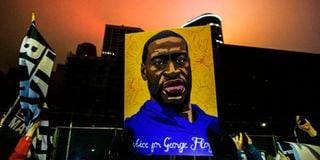Kenyans in US still sceptical despite guilty verdict for Floyd’s killer

Demonstrators march through downtown on April 9, 2021 in Minneapolis, Minnesota. They were demanding justice for George Floyd.
The conviction of a police officer in the US for the murder of a black man during an arrest captured on video and watched by millions around the world has been hailed as a watershed moment. But many black people, among them millions of Africans living in the US, are still sceptical that things will change with just this one conviction.
It is extremely rare for a US police officer to be charged over deaths in custody. But Derek Chauvin, the officer who had his knee on Floyd’s neck for more than nine minutes, now faces a jail sentence for killing him. Chauvin was found guilty on Tuesday of all three charges against him in one of the most consequential trials of the Black Lives Matter era.
Chauvin, 45, was convicted of second-degree unintentional murder, third-degree murder and second-degree manslaughter. The jurors deliberated for more than 10 hours over two days before coming to their decision.
For many Kenyans in the US, among them award-winning Kenyan-American journalist Edwin Okong’o, moments like this only help to resurrect the trauma many people of African descent have experienced at the hands of the police.
Chauvin’s conviction
For Okong’o, the Floyd case has been indeed personal because, as he wrote on his Facebook timeline soon after officer Chauvin’s conviction, “I could have met the same fate as George Floyd at the hands of the same Minneapolis Police Department way back in 2008 when most people didn’t have camera phones. Fortunately for me, I had Andy Peters. He was my Darnella Frazier, who recorded Chauvin murdering Floyd”.
Okong’o says the fear of being the next victim of police murder in the US is in him every day.
“It’s mentally exhausting to be constantly thinking that things white Americans do every day could get me killed,” Okong’o wrote in An Injustice Magazine.
“I relive my encounters with the police and think about how differently things could have turned out for me. What if my car window had been out of order that night when Milpitas cops ordered me to roll it down? What if, as a new immigrant struggling to learn American English, I had misunderstood their commands?”
Ms Felisters Njeri of Lowell, Massachusetts, agrees with Okong’o that one of the most disheartening thoughts is the psychological terror black families endure when their loved ones are out.
“I have three sons aged 26, 21 and 19 and I can’t bring myself to go to bed if all of them are not back home from either school or work. I’m always praying for their safe return every day. If I hear a knock on the door and either all or one of them is not back home, my heart sinks,” she said in a recent interview with the Sunday Nation.
A number of Kenyans interviewed by the Sunday Nation said it was ironic that they felt more threatened in a country they had come to to escape insecurity back home.
“I worry about my husband every time he’s out,” said Ms Linda Anyango of Elkton, Maryland.
But there are also many who believe Chauvin’s conviction is significant and may lead to much-needed reforms in the police departments. “I think it’s the first step in reforming the police departments in the US. However, there is still a lot of work to be done. There are 18,000 police departments in the US whose oversight is left to the state governments as per the 10th Amendment,” said Prof David Monda, a Kenyan lecturer at City University, New York.
Police unions
Prof Monda says President Joe Biden should provide incentives to the states to reform police departments. He, however, says the President should be ready for strong opposition from the gun lobby, some conservative state legislatures and police unions. “In addition to this, citizens need to be educated on how to record police brutality,” he added.
Mr Washington Osiro, a Kenyan author based in San Francisco, California, says even though the conviction rate of police officers involved in senseless killings of blacks in the US is woefully low, the conviction of Chauvin marked an inflection point in the conduct of America’s law enforcement personnel. He expressed hope that, with Joe Biden and Kamala Harris in office, it may be just that.
“I am curious to see if the George Floyd Policing Act is adopted by this Congress. Specifically, I am curious to see if the qualified immunity police have enjoyed and used to cover acts of egregious violence/brutality against minority communities is amended/repulsed. Americans have been here before, where a seemingly critical mass of citizens comes out against patently obvious injustices like in the case of Rodney King,” he said.
In spite of the skepticism around the George Floyd case, Mr Osiro believes Generation Z, which effectively propelled the George Floyd murder onto the nation’s and global conscience, will remain engaged and eventually force socio-political reform. “The wild card in all this? The power of social media to organise, mobilise and bring about change,” he enthused.





